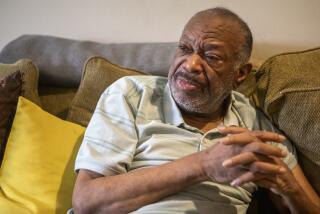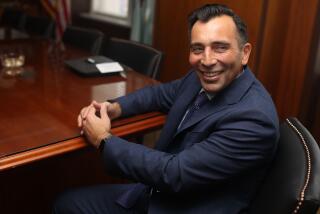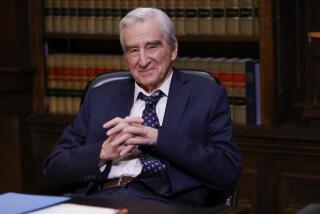A standing ovation for a gutsy lawyer
- Share via
THERE aren’t a lot of standing ovations for public defenders, and most of the time hardly any notice at all, unless one is caught sleeping during a trial or appears in court too drunk to stand.
Nine times out of 11 they show up clean and sober, do their job with lawyerly efficiency and drive home to a spouse, three kids and a tuna casserole. No media, no scandal and not a lot of money.
In that kind of assemblage, one has to wonder how Jimmy Mac fit in. He was an ex-con who wore a lime-green suit, irritated judges by calling them by their first name and just barely made it into law in the first place.
His real name was James Alfred MacDonald. He died of cancer not long ago, but even dying he was still practically crawling back to the courthouse to take care of his clients, because they were the kind of people he knew like no one else could. Street people. Losers. They needed him.
A guy like that shouldn’t die unnoticed.
I heard about Jimmy Mac from another public defender, Michael Lee, who was still stinging over a column I wrote so long ago that I couldn’t remember it. He said I had trashed the public defender’s office, but he indicated I could make up for it by hearing about Jimmy.
So I met with Lee and with Rose Reglos, who was Jimmy’s boss in the Van Nuys office. They gave me pictures of him, a thin guy, not too tall, with a shaved head and a flashy tie who was either smiling broadly, salsa dancing, giving the photographer the middle finger or staring into the camera with a thousand-mile look in his eyes.
He was all of those depictions, defiant, fun-loving despite a grim past, a guy who’d go anywhere (even Cuba) to mambo, and a man wounded in different ways by war and by life, who ultimately became an attorney for the damned.
Drafted into the Army, he fought in the Korean War, participated in three major battles and came out addicted to heroin. No one knew how that happened exactly, but one route to heroin in a war is the morphine used to dull pain.
Arrested for the first time in 1956 for forging prescriptions, he spent a good part of the next two decades in a drug-blurred world that took him in and out of state prisons and county jails. In 1972, he went to work in a VA methadone clinic and cured himself by helping to cure others.
That turned out to be a kind of mantra of his future. “He became his own client,” was the way Lee put it. Jimmy Mac saw himself reflected in the outlaws he represented and talked to them the way he’d probably talked to himself when he was trying to straighten out his own life.
At some point he decided to follow in his father’s footsteps and become a lawyer. He attended People’s College of Law in L.A., where you’ve got to be interested in working for underdogs, radicals and the dispossessed to get in.
One of its best-known graduates is currently the mayor of L.A. It was Jimmy Mac’s kind of school too. Working for the dispossessed was exactly what he had in mind.
He became a lawyer in 1983 after receiving a certificate of rehabilitation from the state, and after overcoming the objections of the California Bar Assn., joined the public defender’s office a year later. Six years after that, he won a full pardon from then-Gov. George Deukmejian.
Jimmy Mac was different from other lawyers. He wore bright suits and had a way of talking that let you know he’d done time. He addressed his clients -- murderers, drug addicts, rapists and robbers -- in the kind of language they understood.
In one instance, a colleague remembers, he warned a client who insisted on taking the stand, “You have an absolute, unconditional right to testify, but if you do, I’m going to [sodomize you] right here in open court.”
But he was also a dedicated lawyer, arriving early and staying late, reading everyone else’s cases, sticking hundreds of Post-it notes on a wall by his desk that were filled with case references and snippets of law, giving those he represented probably more than they deserved. He won some, he lost some, but he never stopped trying.
“We all practice law for different reasons, for money or for the win,” Reglos said. “Jimmy’s motivation was from the heart. He did it to help people.”
Smoker, drinker and ex-heroin addict, it all caught up with him last month. Almost too ill to function, he had to be dragged out of court to be hospitalized, where he was eventually told he had colon cancer. But even after being diagnosed, he insisted on going back to work, back to his outlaw clients, and did so for two days until he had to return to the hospital, where he died at age 74.
His graveside service was sad and funny, which, in a way, summed up the man in the lime-green suit. He was those things and more. “He was the kind of guy,” Reglos said, “who’d throw himself in front of a bullet for you, to make sure you were OK. He was my hero.”
For sure, he overcame much and learned from it to serve those who reminded him of himself. Maybe a standing ovation is warranted this time. On your feet, L.A. A good man has passed our way.
*
Al Martinez’s column appears Mondays and Fridays. He can be reached at [email protected].
More to Read
Sign up for Essential California
The most important California stories and recommendations in your inbox every morning.
You may occasionally receive promotional content from the Los Angeles Times.










